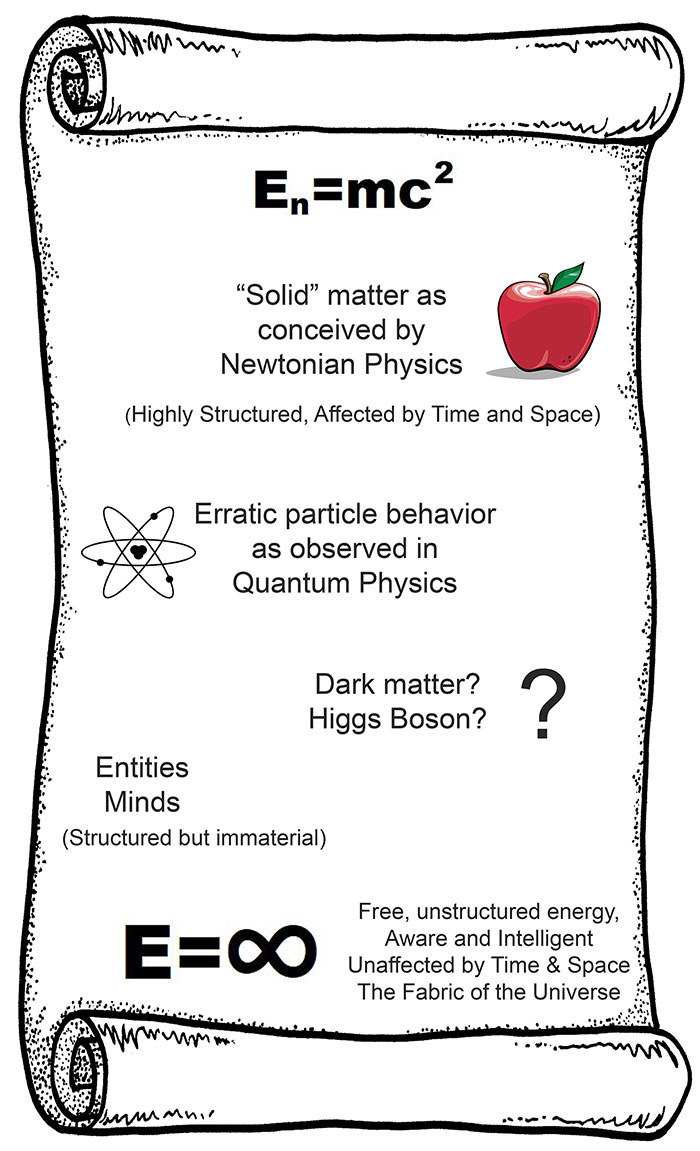By John Pint
"En-ergon
is the father of everything, king of all things and, out of it, all
forms of contrast originate. Since ‘en-ergon’ is common to everything,
it is vital for life itself.”
--Heraclitus, in
his book about nature, according to American science writer Gerrit
Feekes (1986)
This essay begins with the realization that scientists have devoted a
great deal of study to the m in E=mc˛, but not enough to the E.
For
many years, Caleb Gattegno studied the characteristics and powers of
the human mind. In his book, The Mind Teaches the Brain (Gattegno,
1975), Gattegno makes the case that the mind and the brain are not the
same, that the mind is present in the self even before the brain is
developed. Gattegno further states that the mind is “a quantum of
energy.” This essay was born of an attempt to understand the meaning of
the word “energy” in this expression. If Gattegno is right, the mind is
a reality, an entity which can be studied, even though it is immaterial
and cannot be weighed or measured by present-day technology.
What
can Physics make of this? A number of years ago, the very possibility
that an invisible, unmeasurable entity could exist would have been
dismissed as preposterous by serious scientists. Today’s scientific
community, however, grapples with subatomic particles that can’t be
properly measured and cosmic phenomena such as dark matter and black
holes whose existence may be known only indirectly.
This situation drives the present study, which attempts to redefine the
universe entirely in terms of energy.
The
proposal of an energy continuum with “hard bodies” at one end and a
field of invisible, unmeasurable energy at the other, gives a place
both to the mind and to the subatomic particle and to other phenomena
which may lie in between.
What follows is a scheme that finds a place for the quantum of energy
described by Gattegno.
Free energy
Let
us say that the very fabric of the universe is free, unprogrammed
energy, which we will call E. We can represent this by the formula E=∞.
This
free energy is the stuff from which everything is made. In its
unprogrammed state, it is free of the limits of time and space. It
permeates everything that exists.
Intelligence and awareness are some of its characteristics and it is
capable of programming itself.
The Energy Continuum
The continuum might be thought of as stretching from free energy to
what Newtonian Physics thought of as solid matter.

Everything
beyond free energy is programmed energy. The human mind would be an
example of a program or structure which we are presently unable to
measure or observe directly, but which might be designated as
E1,
a level close to but different
from free energy.
Further
along the continuum we have structures which we can observe indirectly,
for example particles being studied in Quantum Physics. Dark Matter may
be another example. Still further along the continuum we find what
Newtonian Physics considered “solid” matter. Here we could apply
Einstein’s formula, but we need to qualify the “E” in the formula in
terms of where we are along the continuum. If we could impose a grid on
the continuum, we might qualify the energy of which minds are made as
E1
and the energy of a subatomic
particle as
E2.
Perhaps the energy observed in
Newtonian Physics might be
E5,
but much study remains to be
done to distinguish the characteristics of
energy at various points along the continuum as it becomes more
predictable and less erratic. Therefore, Einstein’s formula might be
written as
En=mc2,
no
longer conflicting with the behavior of energy noted at other points
along the continuum, but open to future discoveries which will pinpoint
more accurately its place on the scale.
How to order the grid
and subdivide it is exactly the job of Physics, which should be
considered the study of energy in all its forms, including
“non-physical” or immaterial forms whose study will require new tools.
References
Gattegno, Caleb, The Mind Teaches the Brain. New York: Educational
Solutions Inc., 1975.
Gattegno, Caleb, On Death, An Essay. New York: Educational Solutions
Inc.,1978.
|